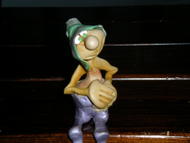Coffee
Ethiopia is known for its coffee produce. Jimma is one of the best known places for coffee. People usually make fresh coffee at home. The beans is sold in the market, fresh from the plant. Many people have coffee plants at their home and use the beans from them. They roast them fresh and grind them and then make the coffee on a traditional pot called "gebanah". They brew the coffee on the gebanah and then serve it without milk.
This whole coffee-brewing thing is an important traditional ceremony in Ethiopia, called "Buna Ceremony" or "Coffee Ceremony". Its one of the hospitality ceremonies there. The ceremony is set elaborately. There is a plastic decorated sheet which is laid out first and many things are placed on it. There's a coffee table placed at the centre of the sheet. The coffee table is a small table with a drawer where the coffee cups, saucers and spoons are kept. The gebanah is placed on top of the table. The person who serves the coffee (its a woman thing) sits behind the table. They place the stove to one side of the table. The stove is a small mud one, runs on charcoal. They have a small grinding thing as well, dont know what its called. So they fry the beans, then grind it, then put it in the gebanah and fill it with hot water. They let it brew for sometime before serving it.
During festive times, Ethiopian people have a tradition of spreading grass on the sheet where the coffee table sits. They also spread grass in the house as well. I didnt get an explanation as to why they do it when I asked many locals. The buna ceremony is done after lunch, in the evenings and other special occasions. They also serve "korsa", fried peanuts or chickpeas. This is given prior to having coffee because they say that coffee should not be had in empty stomach.
This whole coffee-brewing thing is an important traditional ceremony in Ethiopia, called "Buna Ceremony" or "Coffee Ceremony". Its one of the hospitality ceremonies there. The ceremony is set elaborately. There is a plastic decorated sheet which is laid out first and many things are placed on it. There's a coffee table placed at the centre of the sheet. The coffee table is a small table with a drawer where the coffee cups, saucers and spoons are kept. The gebanah is placed on top of the table. The person who serves the coffee (its a woman thing) sits behind the table. They place the stove to one side of the table. The stove is a small mud one, runs on charcoal. They have a small grinding thing as well, dont know what its called. So they fry the beans, then grind it, then put it in the gebanah and fill it with hot water. They let it brew for sometime before serving it.
During festive times, Ethiopian people have a tradition of spreading grass on the sheet where the coffee table sits. They also spread grass in the house as well. I didnt get an explanation as to why they do it when I asked many locals. The buna ceremony is done after lunch, in the evenings and other special occasions. They also serve "korsa", fried peanuts or chickpeas. This is given prior to having coffee because they say that coffee should not be had in empty stomach.


0 Comments:
Post a Comment
<< Home